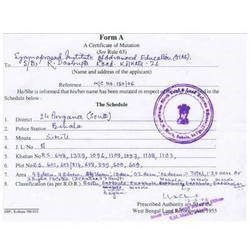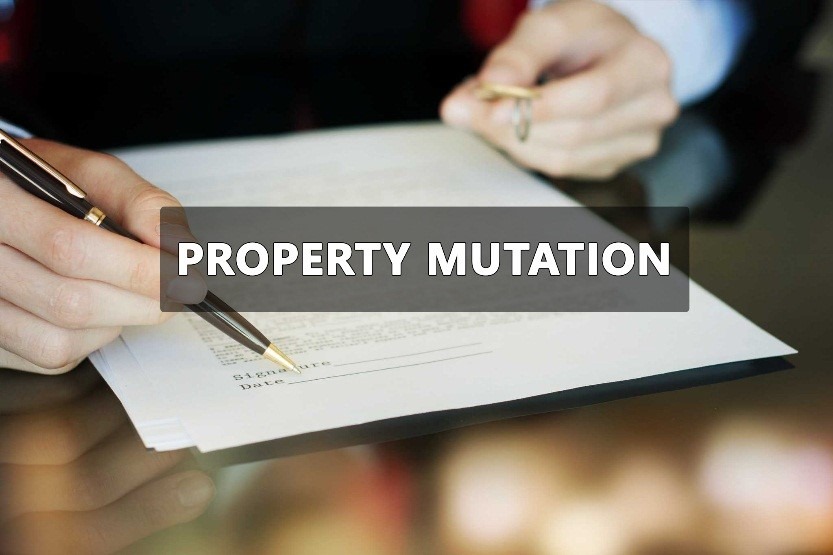Wondering how to apply for mutation of property online? This usually varies from one city to another, depending on the municipal corporation’s procedures and instructions. However, before you’re applying, you should learn more about property mutation and all its core aspects.
What is mutation?
Mutation basically refers to the change in ownership of a property title whenever the property is transferred or sold. Through the mutation of a property, the new property owner will have the property recorded in his/her name in the land revenue department. Thus, the Government will charge taxes from the owner of the property. The fees that are payable for mutation and documentation varies from one state to another.
The difference between registration and mutation should be carefully kept in mind though. The sale deed of property should be registered at the sub-registrar’s office and the buyer can then apply for mutation of the property which will involve the title change in the records for integrating his/her name for the property in question. The seller should arrange for the valid certificate of completion in order to execute the transfer of property. In case of registration, the property is actually transferred to another person from one person while in case of mutation, the name of the rightful owner and tax payer is entered into the records. Mutation is also called Dakhil Kharij and in case of mutation of property after death, it should be done through submission of copies of the relationship documents and death certificate.
Revenue records should be updated in case a property has been purchased through the registered power of attorney and with regard to land ownership, mutation is also a crucial document. This comes in particularly handy in terms of land acquisition by the Government or any other organization. The funds will be released in the name of the person who is registered as the land owner. Mutation will help transfer the property ownership to the rightful owner who can get funds thereafter in the event of a sale or acquisition.
 Property mutation process
Property mutation process
With regard to the property mutation procedure, here are the key things to keep in mind:
- An application has to be made to the area tehsildar on a plain paper in addition to the requisite value of the non-judicial stamp paper.
- The details required with the application have to be submitted likewise.
- These include the area in which the right has been acquired and description of the same.
- Other key information include the owner’s name, parent’s name, address and address of the person from whom he/she has acquired the right and manner of acquisition.
- Name and parent’s name of person from whom the right has been acquired is also needed along with the date of right acquisition.
- Copy of the document is required, based on which mutation is required, namely the will or sale deed.
- A proclamation will be released, seeking any objections towards the mutation proposed with the date specified, within 15 days of the proclamation date up to which objections will be entertained.
- The report of the Patwari is then submitted in the format prescribed and statements of all parties are noted. Document contents are matched with the statements recorded. Objections received, if any, are sanctioned and verified.
- Parties aggrieved by the order of mutation can file appeals to the Additional Collector/Deputy Commissioner within 30 days from the order.
Documents Needed
Here’s a list of documents that are required for this process:
- Sale Deed Copy
- Application for mutation by affixing the court fee stamp
- The key affidavit for mutation of property on stamp paper of necessary value
- Indemnity bond on stamp paper of requisite value
- Up-to-date receipts of payment of property taxes
There are often mutation documents needed in case of a will/inheritance:
- Copy of will/succession certificate
- Death certificate
- Indemnity bond on stamp paper of requisite value
- Up-to-date receipt of property tax payment with regard to power of attorney
- Affidavit on stamp paper of requisite value with notary attestation
- Power of attorney copy
- Receipt of payment that has been registered with sub-registrar
- Copy of will
- Application for the mutation with court fee stamp affixed on the same
- Rough site plan with different building portions may also be required in addition to details of people occupying the portions
- An indemnity bond may also be asked for in some cases, which is an undertaking stating that the municipal corporation is indemnified by the executant in case of disputes arising from mutation
Mutation in MCD
For mutation in MCD, the entire procedure and aspects are listed below. It should be kept in mind that mutation of property in Telangana or mutation of property in Gurgaon will require varying documentation and fees will also vary, as in other Indian cities and States.
Here are the documents required-
- Application on plain paper with non-judicial stamp of maximum Rs.5
- Name of village in which right has been acquired
- Name, parentage, caste and residence of person from whom the buyer has acquired the right
- Manner of right acquisition
- Name, caste, parentage of person acquiring the right
- Date of right acquisition
- Copy of document based on which mutation is being sought, i.e. will or sale deed
One has to visit the office of the Naib Tehsildar or Tehsildar of the area in which the property/land is located between 9.30 AM-5 PM on working days for this purpose. The proclamation will first be issued, inviting objections, if any, to the mutation proposed and the date being specified till which any objections will be entertained. The Halqua Patwari will provide the report in the format prescribed and the statement of parties will be required accordingly. Matching of documents with statements recorded will be done and in case of objections, they will be sanctioned accordingly.
In case of objections against mutation, the issue will be referred to the SDM (Revenue Assistant) of an area. Any party that has been aggrieved can file an appeal within 30 days from the order before the Additional Collector. Responses are expected within 30 days at the most.























